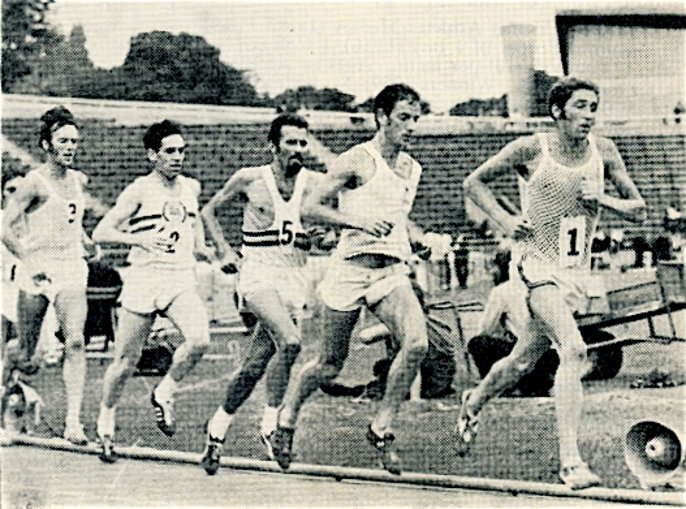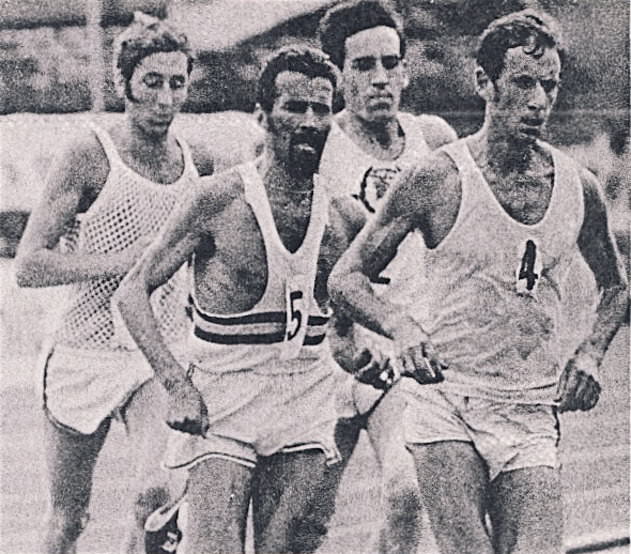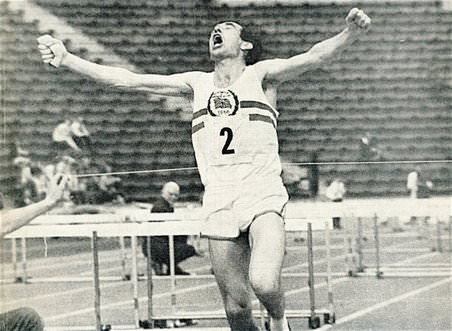Articles / Great Races
Hill v Johnston v Alder v Roelants v Turner (1970)
By John Cobley
23rd January 2012
GREAT RACES #20
30,000 Crystal Palace, September 5, 1970
A lot of international runners were still in top form after the 1970 Commonwealth Games in Edinburgh, and they were looking for races. On September 5, Coca Cola sponsored an international meeting at the relatively new Crystal Palace Stadium, which boasted a tartan track. One of the races set up for the meet was an unusual one: 30,000 meters. And the target was Jim Hogan’s WR of 1:32:25.4.
 |
| Ron Hill leads Tim Johnston, Gaston Roelants,Jim Alder and Mike Turner in the early stages. |
An impressive field of in-form distance runners was assembled:
Gaston Roelants. This great Belgian runner was the 1964 Olympic and 1962 Euro steeplechase champion; he had broken the WR twice in this event. He was also a fine cross-country runner with three International titles. In the late 60s he had focused more on longer distances, winning a silver in the 1969 Euro marathon and setting WRs in 20k (58:06.2) and One Hour (20.664K).
Tim Johnston. After establishing his reputation as a cross-country runner, he became a respected track runner after setting a British record for Six Miles (27:22.2). In the late sixties he moved to the Marathon. He won the 1968 UK Olympic trials Marathon and was considered a favorite for Mexico. However, after running with the leaders for 20K, he fell victim to the altitude and finished 8th. He was a former WR holder for 30,000 (1:32:34.6 in 1965)
Ron Hill: Up to 1970, he had been one of England’s finest distance runners, but had been unable to succeed in big races. In 1970 all that changed when he won both the Boston and Commonwealth Games Marathons (2:10:30 and 2:09.28—first under 2:10). In 1968 he had broken the 10 Mile WR twice (47:02 and 46:44).
Jim Alder: In 1964, he had set a WR for 30,000 with 1:34:01.8. Alder was primarily a marathoner. His achievements in this event were as follows: 1966 Commonwealth Games--Gold; 1969 European Championships--Bronze; 1970 Commonwealth Games—Silver.
Mike Turner: Although primarily known as a cross-country international, he had run an impressive 20.010K for One Hour in 1969.
Ron Grove: One of England’s top distance runners, he had posted world-class time in 1968: 47:02 for 10 Miles and 20.303K for One Hour.
 |
| Only four now in contention: Johnston, Alder, Roelants and Hill. |
Conditions for the race were far from perfect. It was warm and humid, and there was a wind that Mel Watman described as “troublesome, though not violent.” (AthleticsWeekly, Sept. 12, 1970). There were 10 runners on the start line. The goal was to run the 75 laps in less than 73.93 (Hogan’s average in his 1:32:25.4 WR).
In the early going, the runners took turns leading. The times for the first five kilometers were 2:56.6, 2:57.2, 2:59.2, 3:02.0, 3:02.2. At 5,000 Turner led the field in 14:57, already six seconds up on Hogan’s record run. This pace was maintained to 10,000 (2:58.8, 2:59.6, 3:03.2, 2:59.0, 3:01.2) As Roelants led the pack through 10,000 in 29:59.0, the pace was starting to tell: Turner and Grove were just beginning to lose contact.
The leaders were now 11 seconds up on Hogan’s pace and were moving at sub 1:30 speed. At this point, Alder and Johnston took charge, although the pace leveled out (3:00.8, 3:02.0). Then Alder upped the pace with a 2:58.6K. “I could see Ron was troubled,” he told Watman after the race. His surge caused Hill, who at the start hadn’t felt like running at all, to drop back.
Alder didn’t ease up. He reeled off fast laps of 71.6, 70.6, 71.2, 70.2 and 70.8. This was enough to drop Roelants, who was holding his side in pain. Alder had run the third 5,000 in 14:58, and only Johnston had been able to stay with him.
Alder was on 1:29:54 pace at halfway with 44:57. Johnston was right on his heels. Behind them Roelants clocked 45:05, Hill 45:10.8, and Turner 45:24.6. Despite his fast pace, Alder still appeared anxious to get rid of Johnston. He maintained his faster pace with a 2:57.6 and a 3:00.0. At 10 Miles (48:12) he was finally on his own. Following him were Johnston (48:19), Roelants (48:28), Hill (48:33) and Turner (48:49).
Alder almost kept up his pace for the 18th and 19th kilometers (3:02 and 3:02), but then he gradually slowed. Approaching the 20,000 mark, there was a big change behind Alder as Roelants stopped briefly, started again and then dropped out.
With a 3:04.8 kilometer, the slowest so far, Alder passed 20,000 in 60:03.6, 46 seconds up on Hogan’s schedule. Johnston (60:34.4) had lost a little of his advantage over Hill (60:46.8), while Turner was falling back (61:10.8).
Over the next 5,000 all the three leaders slowed. Alder clocked 3:05.4,3:04.2, 3:05.4, 3:07.2 and 3:08.6 for a 5,000 time of 15:30.8. Despite this significant slowing, he increased his lead over Johnston (1:16:20.6) from 30.8 to 46.2 seconds. The big drama was behind him as Hill (1:16:28.4) had closed the gap from 12.2 to 7.8 seconds. Turner was a solid fourth in 1:17:27.8.
 |
| Jim Alder celebrates his new world record. |
Over the final 5,000, Alder managed to maintain his advantage over Johnston, although he slowed considerably. At the tape he was 26.0 ahead, having covered the last 5,000 in 15:56 (3:11.0, 3:11.4, 3:12.4, 3:11.8, 3:09.4). With a time of 1:31: 30.4 (average lap 73.67), Alder regained the 30,000 WR he had first held in 1964, when his time was 2:31.4 slower (1:34:01.8). Johnston showed his strength to move away from Hill, increasing his advantage from 7.8 to 20.6 seconds over the last 5,000. The first three runners were all inside Hogan’s previous WR. Mike Turner, who ran well for fourth, missed it by 76 seconds.
Post Mortem: Jim Alder, whose main achievements had been in he Marathon, showed that he had the speed for shorter distances. He had after all won a bronze in the 1966 Commonwealth Six Miles. As well, he had only six weeks to recover from the Commonwealth Games Marathon, in which he finished second behind Ron Hill. Tim Johnston, after his setback in the Mexico Marathon and a subsequent career-threatening injury, showed his great resilience and courage. It was perhaps not surprising that Ron Hill was only third. After running the first-ever sub-2:10 Marathon only six weeks previously, he was clearly not quite 100%. And he had raced a lot that year—something that Alder felt affected his race. Hill expressed great disappointment in his book: “I was annoyed and humiliated at being able to only jog round in front of a huge crowd.” (The Long Hard Road, p.125). Nevertheless, Hill’s “jog” enabled him to beat the WR by 18 seconds. What a shame that Roelants was forced to drop out. The amazing Belgian could well have stirred up this great race into even faster times. Overall, it is worth repeating that these great times were achieved in less than ideal conditions.
Postscript: Jim Alder’s 13:31:30.4 WR was to last eleven years. In 1981 Toshihiko Seko of Japan ran 1:29:18.8. The British record is still Alder’s, while Johnston, Hill, Hogan and Turner still have the next top-four all-time performances. Seko’s 1981 time has only been surpassed by one runner: Moses Mosop of Kenya, who ran a 1:26:47.4 WR in 2011. In this race, held in Eugene, Oregon, Masanari Shintaku of Japan ran 1:29:57.3 for second and Hosea Macharinyang of Kenya ran 1:32:25.6 for third.
1. Jim Alder 1:31.30.4; 2. Tim Johnson 1:31:56.4; Ron Hill 1:32:17.0; 3. Mike Turner 1:33:42.6; 5. Ron Grove 1:36:37. 0; 6. Bob Richardson 1:37:42.0.
2 Comments